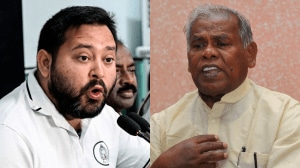Studying abroad brought a complete 180-degree shift in my attitude. From my confidence to my thought process, everything has changed. I am from Guwahati (Assam) and I received my BA in Psychology, Economics, and Sociology with English and Additional English from Mount Carmel College in Bengaluru. Now, I am pursuing an MSc in International Business from Loughborough Business School, UK.
I became interested in business and economics in the final year of my undergraduate studies, notably with marketing, game theory, enterprise creation and entrepreneurship modules. During Covid-19, my interest was piqued by the fact that my mother had begun her own restaurant business; seeing her become independent and her employer had a lasting impression on me.
Story continues below this ad
MSc International Business stood out because I learned how businesses are run, how cross-cultural management occurs in large corporations, and how to view business practices through a global lens, and all the modules aligned with what I wanted to investigate in a global business setting.
Improving skills and employability
Pursuing an MSc in International Business opened up a fascinating trip through the complex web of international trade. This programme, which was broken up into three semesters that lasted around three to four months each, opened the door to a thorough investigation of different business processes, operational complexities, and the laws and trade regulations across numerous cultural and political landscapes.
We were introduced to important core topics in our first semester, including cross-cultural management, innovation and entrepreneurship, global outsourcing and the intricacies of the global business environment.
This semester’s curriculum was an interesting mix of individual and group work, complemented by lively conversations, debates, and a variety of in-class activities to promote interaction and deeper participation. The following semester, we were forced to take a carefully chosen collection of required courses, which included a standout module on personal development.
Story continues below this ad
This curriculum not only gave us insightful information about the evolving job market, but it also gave us the skills and techniques we needed to do well in tests and interviews, which improved our employability. Additionally, we were given the freedom to choose two optional courses from a wide range, allowing us to customise the curriculum to fit our individual interests and professional goals.
In my instance, I decided to explore the fields of Fintech and Digital Marketing, with evaluation methods that mirrored those from the previous semester.
The final semester was a culmination of our academic journey, with an emphasis on the completion of our two essential coursework projects. We profited from lectures, tutorials, and priceless doubt-clearing sessions led by our instructors throughout this time. These meetings helped us decide which businesses to work with and made sure that any lingering questions were skilfully answered.
Our academic journey gave us unique insights into how businesses operate throughout the world while also honing our practical abilities, particularly those related to research and presentations. Our confidence and communication skills were greatly cultivated by the lively classroom debates and discussions.
Story continues below this ad
Additionally, the multicultural makeup of our cohort offered a rare chance to meet with and comprehend people from other countries, encouraging an attitude of respect and compassion.
My decision to enrol in this course was driven by a dual desire to improve my employability and get a thorough understanding of international company operations.
How studying in UK helped me step out of my comfort zone
I work as a student ambassador at my university and this aided me in managing my living expenses in addition to the money that used to arrive from India from my school loan. The employment mostly includes representing the university to potential students at various open days, conducting telephone campaigns, and assisting the university at other events.
I used to work whenever my class schedule permitted it. The job was quite flexible, allowing me to work 20 hours a week as an international student; the work fluctuated, sometimes ranging from one week to two to three weeks in a month. I used to be paid between 11.5 and 11.8 pounds per hour.
Story continues below this ad
These experiences brought a complete 180-degree shift in my entire attitude, from my confidence level to my thinking.
Constant networking, presenting coursework in front of the whole class and panel of professors and external guests, and participating in various events as a student ambassador, course representative, and mental health group facilitator helped me to break out of my shell and step outside of my comfort zone daily, resulting in a significant boost in my confidence and improvement in my communication skills.
The engagement with other brains from across the world with such distinct thoughts, conversations and information has resulted in a definite upgrade in my thinking, a massive opening of my mental walls, and an installation to think bigger than before.
India v/s UK
The study environment here, especially for master’s programmes, differs greatly from that in India for several reasons, including the fact that coursework is more heavily weighted towards research than examinations and that all information must be properly cited and referenced, something I never did while studying in India.
Story continues below this ad
The study is independent. After attending classes and clearing any lingering questions with the professors, it is primarily self-study and research. There is a good balance of practicality and academics in the courses; the professors try to explain the topics with current real-life examples, which helps us to understand the concepts better.
To a certain degree, my experiences in high school and undergraduate college provided a foundation for my transition to a foreign university. They instilled critical classroom discipline, emphasising the importance of attentive topic absorption and meticulous note-taking during lectures. Participation in extracurricular activities beyond academics also enriched my skill set.
However, the crux of my educational evolution unfolded upon entering the foreign university. It was the immersive experience within the new academic environment that truly honed my learning. The challenges, cultural diversity and rigorous curriculum forged a transformative crucible for personal and intellectual growth.
‘Be patient with the process’
It is a difficult decision to leave everything and move to a foreign land, but it is one of the journeys that will transform every aspect of you and your life. You will learn so much about yourself and the world. A few years in a foreign land will accelerate your life journey times. Be proud of yourself and patient with the process.
Story continues below this ad
Create the decision to break out of your shell and move outside of your comfort zone whenever you have the chance after arriving here since development comes from being uncomfortable. Explore new things and locations rather than sticking to your books or laptop.
Travel and create relationships with individuals of outstanding quality. Spend time expanding your knowledge on numerous topics by networking with diverse groups of people. Don’t just remain with your nationality’s group of people; make friends beyond your nationality and network wherever you go. It’s a life-saving skill and hack once you’re here.
(This letter is part of a series by The Indian Express where we bring to you the experiences of students at different foreign universities. From scholarships and loans to food and cultural experiences — students tell us how life is different in those countries and things they are learning other than academics)

































